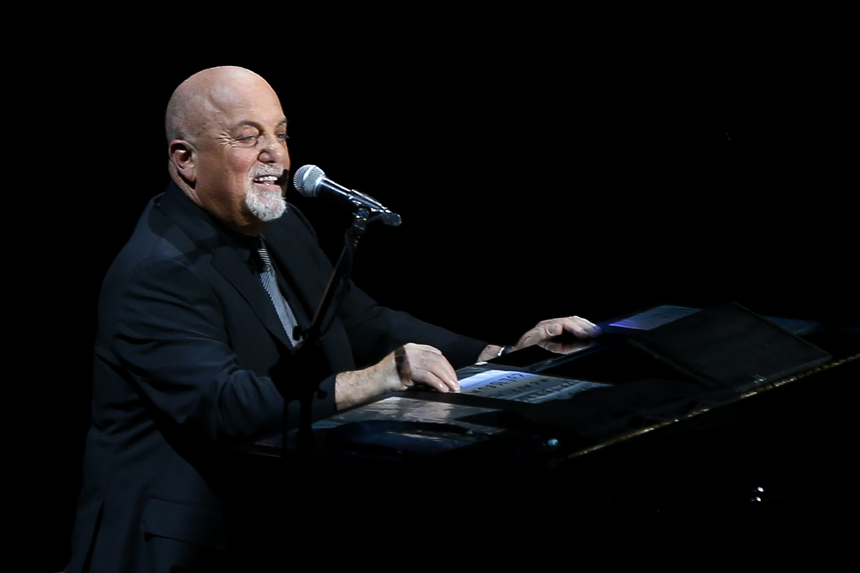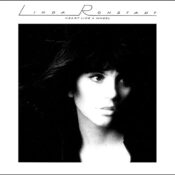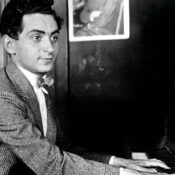Nicknames have always carried a lot of power in music. When you hear “The King” or “The Queen of Soul” or “The Hardest Workin’ Man in Show Business,” you know who they mean. And since 1973, “The Piano Man,” despite the wide variety of people who have famously played that instrument, has only applied to one person. Fifty years ago this week, Billy Joel released a song that wouldn’t crack the Top 20, but was still enshrined for preservation by the Library of Congress. Here’s how he earned the name.
Born William Martin Joel in 1949, Billy Joel was as New York as Springsteen was New Jersey. He was born in the Bronx and spent his youth on Long Island. Though his father was a classical pianist, it was his mother who pointed him toward the piano. He also embraced a more unlikely pastime: boxing. He won 22 Golden Gloves fights before stopping after a broken nose. During his high school years, he had a regular gig playing at a piano bar; the job was crucial to supporting the family, since his father had moved to Europe after his parents divorced. When the performance began to affect his schoolwork and he ran short of credits, Joel simply left high school with the intent of being a full-time musician.
“Captain Jack” (Uploaded to YouTube by Billy Joel)
Influenced primarily by The Beatles, Joel played in bands, did studio work, and began writing songs. One of Joel’s bands, The Hassles, signed with United Artists, but their two albums and four singles didn’t go anywhere. Reinventing himself as a solo artist, Joel signed a deal in 1970 and by 1971 released his first album, Cold Spring Harbor. Though the album wasn’t a hit, Joel was able to open for acts like Badfinger and The Beach Boys. A live recording of “Captain Jack” got enough airplay that Joel was signed to Columbia Records in 1972.
While living in L.A., Joel worked on songs for his second album. Under the alias Bill Martin, he played at a piano bar, The Executive Room, on Wilshire. That experience would inform the writing of the album, particularly the song that would become the title track. By basing the characters in the song on actual people (the bartender’s name really was John; the waitress was Joel’s first wife, Elizabeth), Joel breathed life into the stories that swirled around him as he played. In its own particular way, the tune ran in parallel with the more personal, singer-songwriter material that was popular in the beginning of that decade. However, the fact that seemingly every character had some kind of unfulfilled dream or deep-seated loneliness made the song more universal. Joel could function as a narrator of his own experience while allowing others to connect. That turned out to be the genius of “Piano Man.”
The video for “Piano Man” by Billy Joel (Uploaded to YouTube by Billy Joel)
The single for “Piano Man” was released on November 2, 1973, five days ahead of the album. Other tracks include “Worse Comes to Worst,” “Travelin’ Prayer,” and “The Ballad of Billy the Kid,” all of which would see single releases throughout 1974. The final track of the ten on the record was “Captain Jack.”
“Piano Man” was Joel’s first hit and would become his signature tune. It hit #25 on the Hot 100, and made it all the way to #4 on the Adult Contemporary Chart. While “Worse” and “Prayer” would both crack the Hot 100, they didn’t have the immediate impact of the title song. Nevertheless, the Piano Man album would reach #27 on the U.S. Billboard 200 Album Chart.
“Only the Good Die Young (Live from Boston Garden 1993)” (Uploaded to YouTube by Billy Joel)
Critics and musicologists tend to list Piano Man, the album, as Joel’s first breakthrough. For a few years after, he was steadily making records with memorable songs, but he wouldn’t top the chart placement of “Piano Man” until his fifth album, 1977’s The Stranger. Regularly referred to as Joel’s “second breakthrough,” The Stranger produced four Top 40 hits that are among the most beloved in Joel’s catalog: “Just the Way You Are,” “Movin’ Out (Anthony’s Song),” “Only the Good Die Young,” and “She’s Always a Woman.”
The video for “Tell Her About It” (Uploaded to YouTube by Billy Joel)
As Joel’s star rose and he racked up hits over the next few years, he unveiled an unexpected side. Though he was already a dynamic live performer, he proved that he was uncommonly suited to the dawning age of music video. With a great sense of humor that paired perfectly with his great sense of story, Joel began making more elaborately constructed narrative videos. In 1980, a rather simple video for “It’s Still Rock and Roll to Me” helped him take #1. By 1983, a ’60s-style Ed Sullivan send-up drove “Tell Her About It” to the top of the charts. Joel’s videos helped drive a huge number of Top 40 hits for the next ten years (it didn’t hurt that Joel’s second wife, actress/model/Sports Illustrated Swimsuit Issue cover girl Christie Brinkley appeared in six of those clips). By 1993, Joel had racked up 33 Top 40 hits.
The video for “Uptown Girl” (Uploaded to YouTube by Billy Joel)
1993 is particularly important because, 20 years after Piano Man, Joel stopped creating new albums of original music. As one of the best-selling male solo artists of all-time, the recipient of 23 Grammy nominations, and inductions into both the Songwriters Hall of Fame and Rock and Roll Hall of Fame, he had little left to prove. In 2021, during an interview with Howard Stern, Joel explained that he didn’t feel the need to write lyrics anymore and was more focused on instrumental material.
Since then, Joel has continued to tour and perform. He’s written instrumental music for other artists and released classical material. But on stage, he still channels the life stories that made “Piano Man” a hit 50 years ago. And in stark contrast to other performers who may eschew long-standing hits on stage, Joel makes the song a centerpiece of his concerts. It has been that rare song that has transcended its time and endured. Rolling Stone put it in the 2004 edition of their 500 Greatest Songs of All Time. In 2015, the Library of Congress chose it for preservation in the National Recording Registry for its “cultural, historic, or artistic significance.” As of September 2023, the song had been streamed nearly 250 million times on YouTube and 753 million times on Spotify. When the final word on American popular music is written, no one will look at Billy Joel’s name and say, “Man, what are you doin’ here?”
Become a Saturday Evening Post member and enjoy unlimited access. Subscribe now




Comments
Really excellent feature Troy, on this 50th anniversary of what is still Joel’s most important and indeed signature song. I’m very glad he stopped boxing when he did. Usually getting a broken nose doesn’t lead to your life’s true calling and purpose. The Lord often works in mysterious ways, but sometimes He’s right in your face.
He has that gift to tell engaging stories. ‘Piano Man’ combines the perfect lyrics, melody, arrangement in an ‘old world’ way (especially with the accordion) that would have made the song popular in the earlier 20th, and even 19th centuries with only some lyrical modifications. So timeless, backwards or forwards.
‘The Stranger’ was loaded with hits as you mentioned. My least favorite was “Just the Way You Are.” I love “She’s Always a Woman” even though it’s in the same vein. I bought “Glass Houses” a few years later. “It’s Still Rock and Roll to Me” had an earlier era sound to it and New Wave at the same time. “You May Be Right” also featured the sexy saxophone as the instrumental bridge, though neither song was alike otherwise.
“Uptown Girl” (to me) had that Four Seasons vibe that Joel knew how to update and make his own. Christie Brinkley made it perfect, of course. Around this time he came out “Allentown”, another story-type song that rings even more true now.
His ’93 “River of Dreams” album gets overlooked as a whole, mainly because of “We Didn’t Start the Fire” which is understandable. When new, I’d never heard anything like it in all my life; ever. The lyrics are simply fantastic.
“Davy Crockett, Peter Pan, Elvis Presley, Disneyland’. ‘Sputnik, Chou En-Lai, “Bridge on the River Kwai” quoting two of the best in the long list here. Thanks for the link of Joel’s 2021 interview with Howard. Once again he’s being guided to do what he should be doing in this time, place and space.